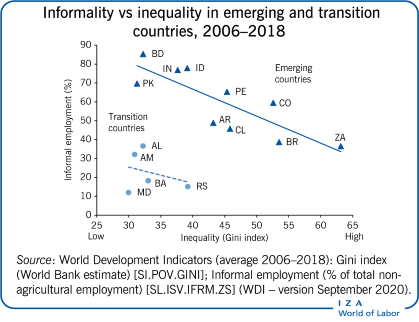Elevator pitch
Higher inequality reduces capital accumulation and increases the informal economy, which creates additional employment opportunities for low-skilled and deprived people. As a result, informal employment leads to beneficial effects on income distribution by providing sources of income for unemployed and marginalized workers. Despite this positive feedback, informality raises problems for public finances and biases official statistics, reducing the effectiveness of redistributive policies. Policymakers should consider the links between inequality and informality because badly designed informality-reducing policies may increase inequality.

Key findings
Pros
The informal economy increases human capital accumulation due to the provision of employment opportunities to low-skilled workers, especially in developing countries.
Informal activities that provide employment to lower-income workers likely lead to beneficial effects on income distribution.
Informal activities can help to maintain economic activity when rent-seeking and excessive regulatory burdens raise the cost of formal production.
Cons
Higher inequality decreases human and physical capital accumulation, which may increase informality.
Widespread informality can lead to severe problems for public finances and reduce the resources available for redistributive policies, potentially leading to less effective redistribution.
Public policies aimed at reducing informality can increase inequality.
Informal workers can be locked into informal jobs, thus decreasing their social mobility.
Due to measurement errors in informality and inequality data, empirical analyses on this issue should be interpreted with caution.